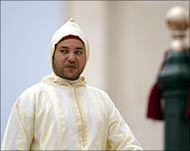Moroccan king bridges divide on marriage law
Just three years ago, proposals to improve women’s rights in marriage and divorce left public opinion divided in Morocco, where Islam is the state religion.

Now, King Muhammad and his advisers appear to have found consensus with a package of reforms which has something for everyone.
Moroccan women’s groups for years lobbied for family law, known as the Mudawana, to be drained of its religious content and treat men and women uniformly.
But the country’s Islamists vociferously opposed any changes that might distance family law from Sharia, the Islamic law.
A revised package of reforms, drawn up by a royal commission, has ingeniously side-stepped the most thorny issues.
The new law will spell out that decisions on children and family planning should be taken by both spouses together. A woman will no longer have the legal obligation of “obedience” towards her husband.
Other reforms, likely to pass smoothly into law with the royal stamp of approval, concern a woman’s right to marry without a male relative’s approval, polygamy, property rights, and a divorced women’s right to keep custody of young children on re-marriage.
Proposal to parliament
 |
|
The king has already outlined |
Forty-year-old King Muhammad has swung the full weight of his monarchical authority behind the proposals, which he has already outlined to parliament.
Feminists had wanted polygamy outlawed, along with the husband’s right to verbally divorce a wife without giving a reason.
But both practices are endorsed in the Sharia. King Muhammad told politicians: “I cannot, as Commander of the Faithful… forbid what the Almighty has permitted.”
However, his religious role as Moroccan monarch allowed the king to face down conservative Islamists and propose changes unheard of in most Arab countries.
It will become difficult to secure a judge’s approval to take a second wife. And no verbal divorces will be valid until approved in court.
On the street, most women had heard about the new law.
Reaction
“If only it had come out earlier!” said mother of five Amina Assanki, 36, from the mountainous Rif region. Her own husband, complaining that child-bearing had spoilt her looks, had taken a second, younger wife, she said.
Dropping its previous trenchant opposition to change, the Justice and Development Party (PJD), the only Islamists in the Moroccan parliament, gave its “firm endorsement” to the reforms.
|
“It had to come out earlier” Amina Assanki |
They would “benefit the Moroccan family and all its elements, husband, wife and children,” said a PJD communique.
Nadia Yassin, a spokeswoman for al-Adl wal-Ihsan (Justice and Charity) Islamist movement, also approved the revised proposals: “We have often stated that the text of the Mudawana is not sacred,” she said.
This new-found flexibility among the Islamists is a sign of the times, wrote Abu Bakr Jamai, editor of the independent weekly Le Journal Hebdomadaire.
In May, bombings by young extremists in Casablanca, Morocco’s largest city, killed 45 people, including the 12 bombers. The more mainstream Islamist groups have been keen to distance themselves from this radical fringe.
“This allowed the monarchy an easy victory,” Jamai wrote. But “easy or not, this reform is a revolution.”
Reservations
Some women’s rights activists have reservations about how the changes will pan out in practice. Judges applying family law are currently all male; re-training has been promised.
From the Islamist camp, Yassin said the legal changes would come up against some harsh grassroots realities, in the conservative and impoverished North African country where half the population of 30 million is illiterate.
|
The new law “gives the Moroccan woman back her honour… “But women have to understand the real meaning of the changes, so they don’t use them to rebel against their husbands” Abd Allah |
“For example, when the new law speaks of dividing up property acquired during a marriage, what possessions are the poor, the great majority of the population, to divide up?” she asked.
On cafe terraces in the Moroccan capital Rabat, many men were dubious about the reforms, one civil servant dismissing them as a “victory for women’s arrogance”.
A bank employee, giving his name as Muhammad, said he feared they would “push men into staying single,” encouraging “immorality”.
The new law “gives the Moroccan woman back her honour,” said Abd Allah, a taxi driver. “But women have to understand the real meaning of the changes, so they don’t use them to rebel against their husbands.”
Moroccan women interviewed, often as outspoken as any western feminist, had no such misgivings. “This new law will set some limits to men’s domination,” said student Zihur Machichi.